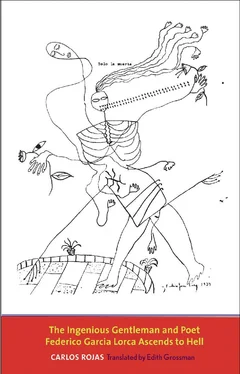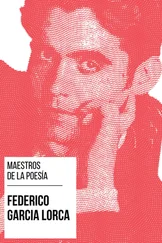“If I’m your dream, who are you?”
“I don’t want to tell you my name because it’s my curse. At one time, when I was as young as you, I was vain about having the name I have. Now I wish I had never been born.”
“I became proud of mine too. I was dazzled to know it was repeated and proclaimed. Now I agree with you, it would be better never to have been born.”
“Be quiet and don’t interrupt! Even in my dream you’re too young to understand prestige like mine, the prestige I had at your age. People recognized me on the street and came over to shake my hand, as if I had worked miracles. At first I told myself: ‘It’s fair because I am who I am.’ Then I started to ask myself: ‘Can they be talking about me? Can they be talking to me?’ You’d never understand … ”
“I understand you perfectly because the transformation in my own legend, I’ve experienced that too.”
“I told you to be quiet! At your age what do you know about me and the times I’m referring to? If you interrupt again, I’ll stop talking. But then you won’t find out what hell really is.”
It was the most ironic of threats, but he made it unaware of the sarcasm. Perhaps he was sincerely convinced he was nothing but part of a dream, though that dyspeptic old man with no accent seemed accustomed to deceiving himself. With an effort he controlled the anger provoked by the old man’s presence, though he could control himself only to the point of replying:
“I’m not a phantom in your nightmare. You’re an apparition in my derangement, and since I can’t explain how I ever imagined you, I must conclude that you’re right and I’ve lost my mind.”
“What? What did you say? Repeat everything more slowly.”
Suddenly he was pretending to be deaf, or at an unexpected moment age had deafened him. He cupped his right hand behind his ear, and he could see his palm crossed by lines and wrinkles. His hand trembled, as if his words had pierced it.
“I think I’ve lost my mind. But you aren’t dreaming me in your nightmare. In fact you exist only to the extent of my hallucination.”
“How do you dare to say I don’t exist?” He flew into a rage, threatening him with his desiccated index finger. “For precisely this reason, for existing and having the name I had, they wanted to kill me like a dog. Ah! What can you know, you fool, about a tragedy like mine! How to make you understand at your age the manhunt and horror I had to live through!”
“Yes, I understand because I’ve suffered them too. Be quiet and go away because you tire me. You didn’t come to hell to tell me anything new, and I have to prepare for my trial.”
From being his hallucination, as he almost came to believe, he must have taken on a life of his own and delighted in displaying it. He passed from anger to a kind of sardonic contempt, stretching out on his seat and smiling at him as he would at a shadow he could brush away or illuminate on a whim. Perhaps that stain on the wall at the Civilian Government building next to Commander Valdés’s door, though it was also Lieutenant Colonel Velasco’s in Valdés’s absence, that plagiarized the shadow puppet of a rabbit and above whose memory the most disconcerting advice had lit up: WHY DON’T YOU PRETEND YOU’RE CRAZY AND BE ACQUITTED? Yes, why not, in fact, he wondered again, insistent on convincing himself: on transforming the question that was beginning to gnaw at and devour him into an academic one. Because simply put, dementia was much more difficult to represent than reason, in the savage comedy of life or the incomprehensible wakefulness of hell. To the exact dimensions of a civilization that for centuries had been calling itself rational and enlightened, men simulated a sanity that would disappear at the first opportunity they had to exterminate one another in the name of their beliefs, without the victims, who probably became executioners when they stopped being victims, able to defend themselves in any way other than to cry out in vain about the mistake, the monstrous mistake, of their sacrifice.
… And the intruder continued to delight in his living presence, stretched out in his seat like a challenge or an insult. He wanted to change his desperate desire to have him disappear without a trace into muffled shouts at some wailing wall of the soul. With useless nostalgia he thought about the characters in his plays or poems whom he would bring down at will at the most unexpected and at the same time the best moment. The man finally dying in peace at the end of a ballad. The Gypsy repeatedly stabbed by envy. The woman possessed and abandoned by her scornful lover when he learns he’s been deceived. The child lost in the sky holding the moon in his hand. They all disappeared immediately, obeying creative demands. “A painter never knows when he’s finished or should finish his painting,” Salvador Dalí had told him, repeating another phrase of Picasso’s he wouldn’t discover until much later. “A poet, on the other hand, never fails to know,” he replied then, truthfully. Now he ought to retract it, because this phantom of his wakefulness in hell, if it really was an image from his hallucinations, remained at his side, imperturbable and tenacious, pointing at him several times with his finger and at other times placing his lined palm behind his ear in order not to miss any of his words or to feign a deafness that might be derisive.
“What did you say you’re preparing for now?” the old man asked, like a burlesque echo of his own thoughts.
“For my trial. You came only to get in my way and interfere with me.”
“You’re not preparing for anything because you don’t know what you’re talking about,” he clucked again, with that exasperating, almost womanish laugh. “I spent all these years in hell, but not in limbo. I have very precise reports about you and yours.”
“ … About me and mine?”
“Yes, sir, that’s what I said. Have you become deaf? You’re a swine, a real swine. When I think about all the sacrifices and suffering of my own youth, of its capacity for devotion and its idealism, the depravity of this gang of yours still seems worse, much worse, than our crimes.”
He thought of Ruiz Alonso telling Sandro Vasari that in view of so much pornography and delinquency, his own times seemed very far away. He thought of his own father, not the father whose words on the day of his brother-in-law’s murder and his own arrest were to tell him he would give anything for him, including his mother and his siblings, because he could never fail him, never, never, never, but the other one: the one of that morning in the Retiro and of his adolescence, standing before Monet’s La Gare Saint Lazare and railing against the impostures of some delinquents who didn’t know how to attract the attention of the ignorant. He thought of himself that day in Madrid, wondering for a moment, which he would then forget until this other instant in eternity, whether he would ever feel and express himself as his father was doing then. Thinking about all this, and in an unconscious transposition that he would immediately understand all too well, he asked:
“Who gave you those reports, the ones you alluded to?”
“Who else would it be? Luis, naturally.”
“Luis … ”
“Luis Rosales.” He said the name impatiently, as if it were taken for granted. “I’ll never leave his house again; it’s where I hid in the summer of 1936. I slept there last night and I’m dreaming you now. How many years have I been hidden in these two rooms on the second floor? Forty, forty-five, fifty? I lost count, but I didn’t forget my decision not to leave there alive. In one winter or another all the Rosales family died except Luis and Esperancita. Now they visit me very rarely, though she knocks on the door three times a day with the flat of her hand and leaves my meals on the floor. They know I prefer not to see them or speak to them because I chose hell and not the world. I can’t free myself from Luis as easily as I avoid Esperanza. He has a key, and from time to time he bursts in, at the most unexpected moments, to talk to me for hours. In the end we almost always argue and I still don’t know whether he wants me to go or expects me to die in his house, God knows when … Just yesterday I told him … ”
Читать дальше












